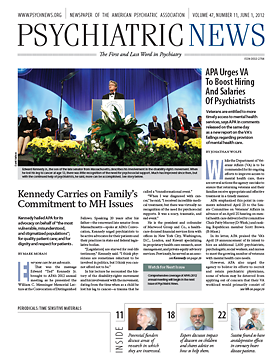Five years ago, psychiatry in Houston’s Harris County Hospital District was concentrated in three large hospitals. Today psychiatric and other mental health services are available in 16 general medical clinics and two schools around the county. That transformation says a lot about the real work of making integrated care a reality.
The People’s Health Center, the largest in the system, is a one-story building faced with stone blocks in the city’s southwest quadrant. It cares for about 100,000 patients a year, said Asim Shah, M.D., in his office just down the hall from other clinicians.
“Patients can see their therapist or psychiatrist the way they see their family doctor,” said Shah, the hospital district’s associate chief of psychiatry and an associate professor of psychiatry at Baylor College of Medicine. “There’s less stigma.”
There is a psychiatrist on duty three eight-hour days a week at the clinic, and a resident covers another day. Two full-time social workers provide therapy. Other clinics in the system employ psychiatrists for one to four days a week.
Under the old system, a patient might have to wait months for an appointment at a hospital outpatient clinic. Now, Shah tells his patients he can see them the same day—provided they are willing to sit in the waiting room until he can work them in.
Incidentally, now that the Menninger Clinic is affiliated with Baylor, Shah likes to say that his patients at the Peoples Health Center are getting the same quality care as Menninger’s patients, although perhaps with a different length of stay.
Shah and his colleagues play another role as well, providing triage assistance and real-time curbside consults with the other physicians in the clinic.
“They all have my cell-phone number,” he said. “They can call or text me anytime. It minimizes the direct load on psychiatry and gives them increased confidence in their ability to handle psychiatric conditions with their patients.”
Co-location wasn’t enough, though. Preparing primary care doctors to do more mental health work was another part of the district’s plan, said Britta Ostermeyer, M.D., chief of psychiatry at Ben Taub General Hospital/Harris County Hospital District and an associate professor of psychiatry and of family and community medicine at Baylor.
“We try to educate family-care doctors, nurse practitioners, and social workers about common psychiatric illnesses, like depression, anxiety, and bipolar disorder,” said Ostermeyer in an interview.
So beginning in 2004, they organized (with colleagues in family medicine at Baylor and the University of Texas branch in Houston) an educational program that was given live and also recorded on DVD for distribution around the district.
The goal was to give the primary care doctors enough information so that they could routinely manage patients once they had been diagnosed and stabilized by the psychiatrist, said David Buck, M.D., M.P.H., a professor of family and community medicine at Baylor and founder of Health Care for the Homeless in Houston. The primary care clinicians would adjust medications, write refill prescriptions, and keep watch on side effects. In theory, this would take some of the pressure off the psychiatrists and let them concentrate on more serious cases and new patients.
“Dr. Ostermeyer and her team did a good job,” Buck told Psychiatric News. But their success in improving the primary care physicians’ ability to recognize psychiatric disorders led the latter to fall back on the specialist model of referring patients to psychiatry and not taking them back into their own patient caseload.
Paradoxically, that happened because there were psychiatrists at the front of the room doing the teaching, reinforcing their role as highly knowledgeable specialists, agreed Ostermeyer.
So two years ago, they collaborated on a new program to train primary care doctors for an expert panel who would be educated by the psychiatrists and then present the mental health material to their primary care colleagues. Another round of education should also help new clinicians who joined the system after the original campaign ended.
“Psychiatrists are experts, but we don’t want them to be the only experts,” said Buck. The goal should be less referral to psychiatrists and more consultation with them and encouragement for primary care physicians to assume a larger role.
Finally there’s something the psychiatrists can learn too.
“Psychiatry in integrated-care settings can be a challenge to traditionally trained psychiatrists,” said Ostermeyer. A psychiatrist who works successfully in a primary care system has to learn how primary care physicians work—going in and out of patient rooms, seeing more than one patient at a time, holding briefer sessions, she noted. “Both need to step out of their traditional roles. The job of the primary care doctor is to practice primary care psychiatry with the help of the psychiatrist.”

